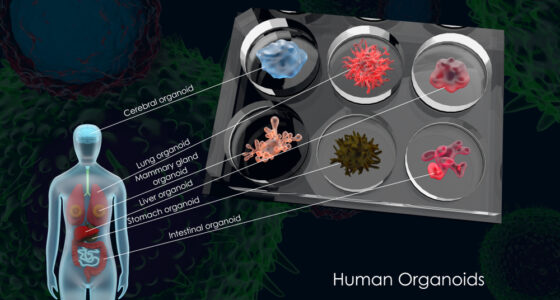Researchers in China are creating miniaturized versions of mesothelioma tumors to create personalized treatment models for this rare and aggressive cancer. Using malignant ascites, pleural effusions, fine-needle biopsies, and surgical tissues to create patient-derived organoids (PDOs), they hope to improve the poor outcomes and therapy resistance typical of the disease.

Mesothelioma Organoids Successfully Recreate Tumor Characteristics
Writing in the journal Scientific Reports, the collaborative group of Chinese researchers explained that they had successfully established mesothelioma PDOs that faithfully mimicked the key characteristics of their parental tumors, thus providing a promising tool for precision medicine.
The scientists used H&E staining, immunohistochemistry, next-generation sequencing, and peripheral blood mononuclear cell-derived T cells to assess different treatments on the organoids they’d created. Because the organoids so successfully captured the features and genetic profiles of their parental tumors, the researchers were able to demonstrate that these three-dimensional models can accurately represent the complex biology of individual patients’ cancers and evaluate the effectiveness of different treatments on each.
Mesothelioma Treatment Responses Change Over Time
One of the most important findings from the mesothelioma analysis showed that PDOs created from the same patient at different time points displayed significant changes in genetic profiles and drug sensitivities. This mirrors the tumor evolution and progression that physicians have noted during disease advancement and highlights the critical importance of long-term monitoring in mesothelioma care, as tumors can develop resistance mechanisms or acquire new mutations over time that alter their response to treatments.
The research suggests that creating new PDOs over time can provide clinicians with valuable general insights into how tumors evolve and adapt, potentially allowing for more timely adjustments to treatment strategies. The researchers hope that co-culturing PDOs and assessing the use of bot chemotherapy and anti-PD-1 immunotherapy will be a valuable tool for advancing personalized precision medicine. The tools offer researchers and clinicians a remarkable ability to test multiple treatment combinations on individual patients’ tumor models before starting therapies, potentially improving outcomes.
If you or someone you love has been diagnosed with mesothelioma, research like this offers the best hope for improved quality of life and extended survival. For information on other resources, contact the Patient Advocates at Mesothelioma.net at 1-800-692-8608.